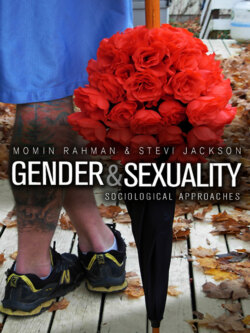Читать книгу Gender and Sexuality - Stevi Jackson - Страница 28
На сайте Литреса книга снята с продажи.
2.9 Sexuality, Knowledge and Power: The Impact of Foucault
ОглавлениеThe French philosopher Michel Foucault has had a profound impact on feminism and the study of sexualities since the 1980s. Foucault published the first of a three- volume history of sexuality in France in 1976, and it was widely translated and began to influence academic work on sexuality in the English- speaking world. In the first volume, subtitled The Will to Know, Foucault argued that the history of sexuality in the West requires an understanding of how knowledge operates and how various different types of knowledge – sexology and psychology in particular – have come to dominate our ways of thinking about human gender and sexuality. By going beyond critiques of the essentialism in these disciplines, he created a new perspective on them.
Foucault argued that the regulation of sexuality was not only repressive but also productive, and that sexology, medicine and the law effectively created sexuality – both ‘perverse’ and ‘normal’ sexualities. These knowledges are a form of discourse. The French word discourse literally means ‘speech’, but Foucault used the term more broadly to denote ways of thinking about and constructing knowledge of the world. He argued that discourse creates its own objects: rather than ‘things’ being taken to exist outside of discourse (our ways of knowing and speaking about them), he focuses on what is produced through discourse. The knowledge constructed about sexuality in the Victorian era, then, was not knowledge about a pre- existing ‘thing’ called sexuality, but knowledge that brought it into being – including the modern usage of the word ‘sexuality’ and a whole lexicon of terms for classifying and categorizing sexualities. These are difficult ideas to understand and best illustrated by one of Foucault’s well- known examples. What had once been merely a sinful act – sodomy – and a ‘temporary aberration’ was redefined as homosexuality, a proclivity of a particular category of person, or ‘species’ – the homosexual (1981: 43). It became possible, as Foucault said, to be a homosexual. Foucault therefore radically challenges the commonsense view that the Victorian age was one in which sexuality was repressed. Instead he argues that there was a ‘discursive explosion’ around sexuality in this era, from which emerged the modern ideas of sexuality as deeply rooted in our inner psychological being. Thus Foucault offers new insights into how biological and psychological forms of essentialism developed. His ideas have influenced historians of sexuality such as Jeffrey Weeks (1989), who draws on Foucault in his detailed historical account of the regulation of gender and sexuality in the Victorian era, showing how legal judgments increasingly relied on sexological and psychological explanations to make their case.
Foucault’s theories are one of range that have been described as ‘post- modern’ because they radically question the possibility of any ‘truth’ existing outside discourse and therefore challenge modernist forms of scientific – and sociological – knowledge. These ideas are also associated with what has been called the ‘cultural turn’, which shifted the emphasis from structural forms of explanation to language and culture (see Parts II and III). Foucault’s ideas have proved extremely influential in helping to challenge and historicize the culturally dominant forms of essentialist thinking that operate in society, but his characterization of identities as effectively created by discourse has been more controversial. Some feminists argue that he is largely insensitive to gender divisions, and others find his challenge to the authenticity of identities problematic for political action. Nonetheless, others have found it useful to think about identity from his rigorously anti- essentialist perspective, using it to challenge dominant or universal concepts of identities, showing, for example, how the category of ‘gender’ is produced by expert knowledges such as feminism which are, in fact, middle- class and white ‘knowledges’. Similarly, those seeking to challenge white and male- dominated gay cultures have used Foucauldian ideas to show how identities are potentially multiple and unstable, but are disciplined into dominant versions (white, middle- class and male) by the production of discourses through gay politics and gay symbolic and economic culture, which create the ‘norm’ for being gay. Foucauldian theory has therefore been a useful starting point for those concerned with illuminating difference and so has impacted significantly upon feminism and lesbian and gay sociology, particularly in a contemporary version called queer theory, which has largely focused on the cultural operation of power/knowledge and how it is manifested through specific binary and hierarchical identity categories such as homo/hetero, male/female, black/white.
